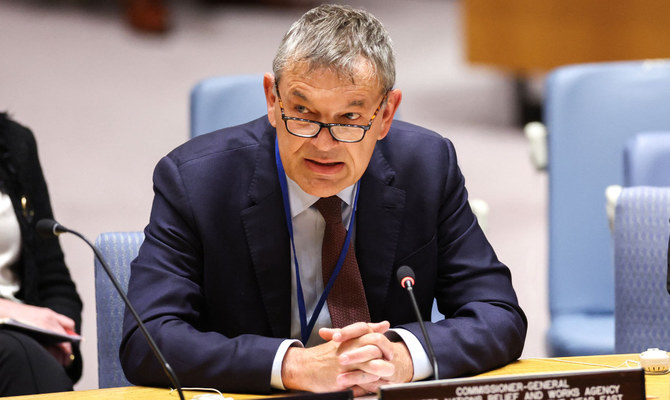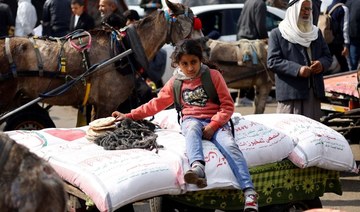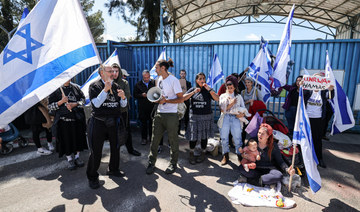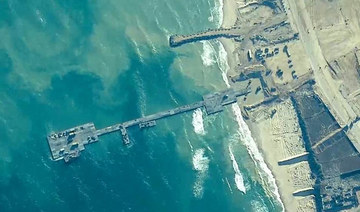NEW YORK CITY: Disbanding the UN Relief and Works Agency for Palestine Refugees would have lasting repercussions for millions of Palestinians because it would result in them being stripped of their refugee status, the head of the agency told the Security Council on Wednesday.
Philippe Lazzarini warned it would also accelerate the onset of famine in Gaza, and jeopardize the eventual transition from a ceasefire to recovery by depriving a traumatized population of the essential services it requires.
Some of the ramifications would be long term, he added: “It will make impossible the formidable task of bringing half a million deeply distressed girls and boys back to learning. Failing to deliver on education will condemn an entire generation to despair, fueling anger, resentment, an endless cycle of violence.”
The meeting of the council was requested by Jordan in response to long-running, continual attempts by Israeli authorities to force the agency out of Gaza, and have it dismantled entirely.
It began with a minute’s silence in honor of the 178 UNRWA employees killed during the war in Gaza.
The agency has been facing great challenges not only in its efforts to provide humanitarian assistance to Palestinian civilians in Gaza, but also in ensuring it is able to continue its operations more generally.
More than 163 UNRWA installations in the Gaza Strip have been damaged during the war between Israel and Hamas, and only nine of its 24 healthcare facilities remain operational.
Meanwhile the agency has been in a precarious financial position for some time, in part because of the decision by some major donor nations to suspend the funding they provide for the agency, which threatened to bring its operations grinding to a halt.
Several countries put their donations on hold after Israeli authorities alleged in January, without providing any supporting evidence, that 12 UNRWA workers had played a role in the Oct. 7 attacks by Hamas on Israel.
The agency terminated the contracts of the employees identified in the allegations, and the Office of Internal Oversight Services, the UN’s main investigative body, launched an inquiry at the request of UN Secretary-General Antonio Guterres.
Separately, the UN also ordered an independent review, led by the French former minister of foreign affairs, Catherine Colonna, of the steps the agency takes to uphold the principle of neutrality among its workers. The review group is expected to present its findings on April 20.
Lazzarini told council members on Wednesday that the real reason behind the Israeli calls for UNRWA to be closed down is not about its adherence to humanitarian principles, it is an attempt to end the refugee status of millions of Palestinians. The true aim is to change the long-standing political parameters for peace in the Occupied Palestinian Territories, he added.
“Accusations that UNRWA has deliberately perpetuated Palestinians’ refugee status are false and dishonest,” Lazzarini said. “The agency exists because a political solution does not. It exists in lieu of a state that can deliver critical public services.
“The international community has long attempted to contain, rather than resolve, the Israeli-Palestinian conflict. Lip service is paid to the two-state solution each time an escalation occurs, costing lives and hope.
“UNRWA was created 75 years ago as a temporary agency, a stop-gap measure, pending a political answer to the question of Palestine.
“If the international community truly commits to a political solution, UNRWA can retrieve its temporary nature by supporting a time-bomb transition, delivering education, primary healthcare and social support. It can do so until a Palestinian administration takes over the services.”
Russia’s permanent representative to the UN, Vasily Nebenzia, called on the Security Council to consider, as a matter of urgency, imposing sanctions on Israel for its failure to implement the council’s recent ceasefire resolution.
“Everyone knows about the facts, the unthinkable statistics, the number of people dead and those in need of urgent food and medical assistance, as well as reported cases of people dying of famine and dehydration, including minors,” he said.
“The IDF (Israel Defense Forces) is blocking half of humanitarian convoys, yet aid supplies are waiting at the border. We warned time and time again that in the absence of a lasting, sustainable ceasefire, which must be duly monitored by military observers, all of our humanitarian efforts are doomed.”
The US deputy ambassador to the UN, Robert Wood, said the conflict in Gaza has been one of the worst in recent memory in terms of the number of aid workers killed, with the total standing at more than 240 since Oct. 7.
“These incidents are unacceptable. Humanitarian personnel must be protected, full stop,” he said, and he expressed deep concern that “Israel has not done enough to protect humanitarian aid workers or civilians.”
Wood added: “UNRWA plays a crucial role throughout the region, contributes to stability of the region and supporting Palestinian refugees, to educating hundreds of thousands of students, to providing primary healthcare and critical relief and social services.
“UNRWA is the bedrock of support for the most vulnerable Palestinian refugees in Jordan, Lebanon, Syria and the West Bank. The United States supports this important work and emphasizes that it must continue uninterrupted.”

























